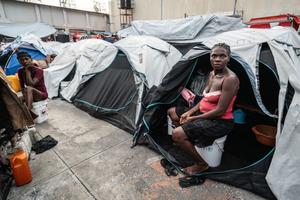Archbishop of Port-Au-Prince: ‘There Is Real Danger of Civil War in Haiti’
Haiti, a nation that has struggled with instability for years, is now facing new, violent unrest. On March 3, the Haitian government declared a 72-hour state of emergency after armed gangs stormed the national prison in Port-au-Prince.

Archbishop Max Leroy Mésidor of Port-au-Prince and president of the Haitian Bishops’ Conference shared his perspective on the difficult situation facing his country and the pastoral work of the Church in the midst of violence, kidnappings and chaos.
“Yes, there is a real danger of civil war breaking out in the country. The armed gangs act like an organized army. They are very well equipped and very well armed. The police cannot keep up with them,” Archbishop Mésidor told Aid to the Church in Need in a March 6 interview.
The archbishop noted that, in some regions, even his own, “there are groups of citizens who try to stand up to the gangs. So there are often clashes between these groups and the gangs and also between the police and the gangs.”
Haiti, a nation that has struggled with instability for years, is now facing what some describe as a “low-intensity civil war.” On March 3, the Haitian government declared a 72-hour state of emergency after armed gangs stormed the national prison in Port-au-Prince.
The violence has spread throughout the country, especially in the administrative districts of Ouest, Centre and Artibonite. The prelate pointed out that “there are no safe areas” since “gangs operate almost everywhere, making it extremely difficult to move, especially outside the capital.”
The Church has not been spared the violence. Archbishop Mésidor lamented the numerous kidnappings of priests and men and women religious: “In 2021 the first priests and religious were kidnapped. In this year, 2024, there were six nuns in January, six nuns and one priest in February, and another priest on March 1."
According to Archbishop Mésidor, the “dictatorship of kidnapping” is a reality that is spreading like “a plague.” However, despite the dangers, he said, it “must be fought,” and the Church will remain firm in its mission and “will not abandon our brothers and sisters.”
When asked about the challenges he faces in his episcopal ministry, the archbishop responded: “It’s really very difficult ... daily life consists of suffering, violence, gunfights, poverty and deprivation,” adding that his pastoral work is very restricted by the situation: “I cannot visit two-thirds of my diocese because the roads are blocked.”
“I have not been to the cathedral for two years,” the archbishop lamented. “Once, while I was in my office, there was a lot of gunfire and I had to stay there for four hours before I could get out to celebrate Mass. Bullets struck my office window. The last celebration I was able to do in the cathedral was the chrism Mass.”
The people, however, are living their faith in these circumstances and despite these circumstances. “Perhaps there was gunfire in the neighborhood the night before. But the next day, even at 6 o’clock in the morning, the church is full. There are people who go and visit the sick, in spite of the danger.”
Archbishop Mésidor stressed that the most important thing “is that the Church continues to bring people together despite all the difficulties.”
“We try to rekindle their hope, to get them to organize themselves and not sink into resignation,” he said. “Whenever possible, the Church continues its mission. But it’s not easy. The motto is: One day at a time.”
This story was first published by ACI Prensa, CNA’s Spanish-language news partner. It has been translated and adapted by CNA.
- Keywords:
- haiti















